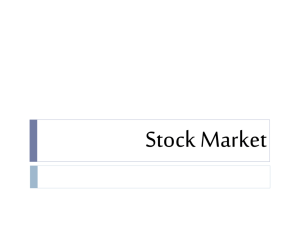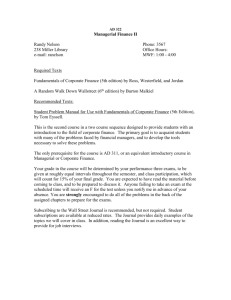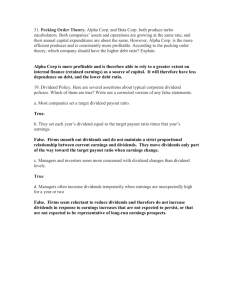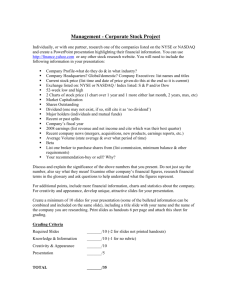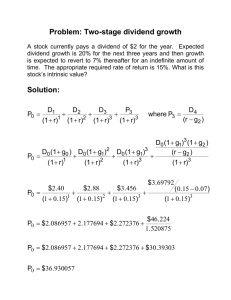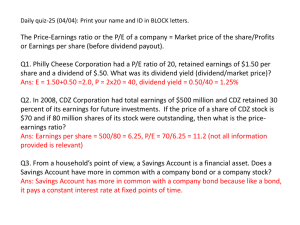Stock Market - Mrs. Golledge
advertisement
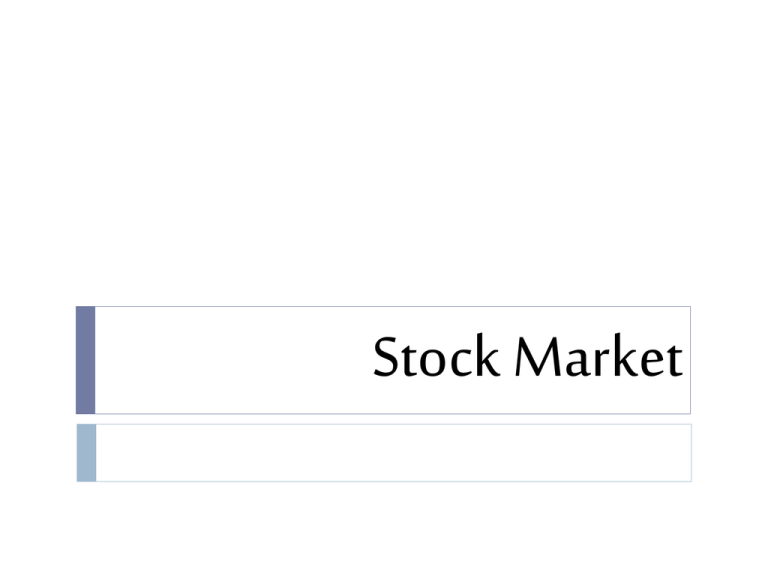
Stock Market What are Some of Your Favorite Companies? What is a stock? A stock is a share in the ownership of a company. Stock represents a claim on the company’s assets and earnings. As an owner (shareholder), you are entitled to your share of the company’s earnings as well as any voting rights attached to the stock. What is the Stock Market? The market in which shares of publicly held companies are issued and traded for money. It provides companies with access to capital in exchange for giving investors a slice of ownership in the company. Who Owns these Companies? General Electric Ownership 41% 59% Apple Ownership Company Owned Publicly Owned http://www.nasdaq.com/symbol/ge/institutional-holdings Dell Ownership 38% 62% http://www.nasdaq.com/symbol/aapl/institutional-holdings Pepsi Ownership 0% 100% Company Owned Publicly Owned Company Owned Publicly Owned 29% 71% Company Owned Publicly Owned http://www.nasdaq.com/symbol/pep/institutional-holdings What is the Difference? Publicly Traded A public company, is a company that has sold a portion of itself to the public Offers some of its stock to shareholders , on the stock market Shareholders have claim to part of the company's assets and profits Privately Traded The company is owned by the company's founders, management or a group of private investors Privately held companies do not have stock traded on the stock market Ticker Symbols An arrangement of characters (usually letters) representing a particular security listed on an exchange or otherwise traded publicly AAPL – Apple Inc. MSFT – Microsoft PEP – Pepsi Co. GOOG – Google Inc. Parent Companies http://www.huffingtonpost.com/2012/04/27/consumer-brands-owned-ten-companies-graphic_n_1458812.html PE Ratio A valuation ratio of a company's current share price compared to its per-share earnings. Calculated as: Market Value per Share / Earnings per Share (EPS) For example, if a company is currently trading at $43 a share and earnings over the last 12 months were $1.95 per share, the P/E ratio for the stock would be 22.05 ($43/$1.95). 52 week high/low The highest and lowest prices that a stock has traded at during the previous year. Many traders and investors view the 52-week high or low as an important factor in determining a stock's current value and predicting future price movement. EPS(Earnings Per Share) The portion of a company's profit allocated to each outstanding share of common stock. Earnings per share serves as an indicator of a company's profitability. Calculated as: Earnings per share is generally considered to be the single most important variable in determining a share's price. It is also a major component used to calculate the price-to-earnings valuation ratio. For example, assume that a company has a net income of $25 million. If the company pays out $1 million in preferred dividends and has 10 million shares for half of the year and 15 million shares for the other half, the EPS would be $1.92 (24/12.5). First, the $1 million is deducted from the net income to get $24 million, then a weighted average is taken to find the number of shares outstanding (0.5 x 10M+ 0.5 x 15M = 12.5M). Dividend DEFINITION OF 'DIVIDEND' 1. A distribution of a portion of a company's earnings, decided by the board of directors, to a class of its shareholders. The dividend is most often quoted in terms of the dollar amount each share receives (dividends per share). It can also be quoted in terms of a percent of the current market price, referred to as dividend yield. Also referred to as "Dividend Per Share (DPS)." 2. Mandatory distributions of income and realized capital gains made to mutual fund investors. 1. Dividends may be in the form of cash, stock or property. Most secure and stable companies offer dividends to their stockholders. Their share prices might not move much, but the dividend attempts to make up for this. High-growth companies rarely offer dividends because all of their profits are reinvested to help sustain higher-than-average growth. Yield DEFINITION OF 'YIELD' The income return on an investment. This refers to the interest or dividends received from a security and is usually expressed annually as a percentage based on the investment's cost, its current market value or its face value. This seemingly simple term, without a qualifier, can be rather confusing to investors. For example, there are two stock dividend yields. If you buy a stock for $30 (cost basis) and its current price and annual dividend is $33 and $1, respectively, the "cost yield" will be 3.3% ($1/$30) and the "current yield" will be 3% ($1/$33).
